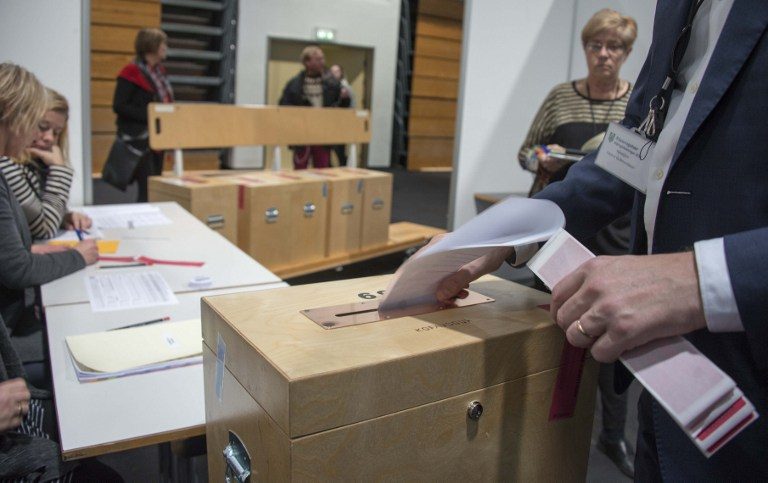SUMMARY
This is AI generated summarization, which may have errors. For context, always refer to the full article.

REYKJAVIK, Iceland (UPDATED) – Iceland’s anti-establishment Pirate Party gained momentum but failed to win a majority in Saturday’s (October 29) snap election, prompted by the the Panama Papers scandal, which rattled the incumbent coalition.
Polls predicted a surge in support of the “Pirates” ahead of the snap vote that followed the resignation of former prime minister Sigmundur David Gunnlaugsson of the centrist Progress Party, the only top leader to do so over holdings stashed away in tax havens.
“We are very satisfied,” said the “Pirates” cofounder Birgitta Jonsdottir, an activist, poet and WikiLeaks supporter.
“We are a platform for young people, for progressive people who shape and reshape our society … like Robin Hood because Robin Hood was a pirate, we want to take the power from the powerful to give it to the people,” Jonsdottir told Agence France-Presse, referring to the legendary English outlaw.
Gaining up to 9 out of the 63 seats in the Icelandic parliament, the Althingi, the Pirates became the third largest party in the island nation, 4 years after it was founded in 2012.
The Pirate Party, whose headquarters is onboard a boat anchored in the port of Reykjavik, intends to reinvigorate democracy, redistribute income from natural resources, health refinance and the fight against corruption.
Preliminary figures came after the polls closed at 10 pm (2200 GMT) and were greeted with applause by activists and “pirates” inside a bar in Reykjavik, crowded with tourists and foreign press.
The Pirates sealed a pre-coalition agreement with three other left-center parties and together they garnered 28 seats of the 32 required for an absolute majority in the Icelandic parliament.
According to preliminary results, the Left-Green movement would garner 10 mandates, the Social Democrats four mandates and the centre Bright Future would gain five mandates.
The center-right Progressive Party gained seven mandates while the Independence Party garnered 21 seats, according to the early projections.
The center Regeneration Party, which could be the kingmakers in the election, garnered 7 seats in the Icelandic parliament.
The leader of the Independence Party, Finance Minister Bjarni Benediktsson, will be given the mandate to negotiate on the majority in the parliament.
“There is a reason to celebrate,” Benediktsson said on public broadcaster Ruv.
Tense negotiations
The negotiations would be very tense between the Regeneration Party and the Independence Party, from which it split over disagreement to hold a referendum on joining the EU.
“We have not been negative towards other parties or how governments should be formed,” leader of the Regeneration Party, Benedikt Johannesson said.
Implicated in the Panama Papers scandals, Benediktsson denies having wanted to escape taxes by creating a company in the Seychelles, saying he has never invested a dime.
Prime Minister Sigurdur Ingi Johannsson told RUV that he would resign on Sunday over the plunge in votes for his Progressive Party.
The election was triggered after the Panama Papers revealed that 600 Icelanders including cabinet ministers, bankers and business leaders had holdings stashed away in offshore accounts.
A fierce defender of public transparency and direct democracy, the Pirate Party has vowed to hold a referendum on resuming the nation’s stalled European Union membership talks.
It has also declared that health care is a basic human right and seeks to make it free of charge and accessible to everyone in Iceland, regardless of their residency status.
Iceland, a volcanic island with a population of 332,000, has returned to prosperity since its 2008 financial meltdown.
Gross domestic product (GDP) growth is expected to be above 4% this year thanks to tourism revenues and a recovering financial system.
The crisis eight years ago saw Iceland’s three biggest banks and its oversized financial sector collapse, while the country was forced to seek a bailout from the International Monetary Fund.
A string of bankers were jailed, the failed banks were temporarily nationalised and then sold, and foreign investors had to accept write-downs on their debt holdings.
Advocating maximum public transparency, the Pirates want to open government accounts to the public.
“We want to drastically increase public access to information about government decision-making,” the party says in its manifesto
Olafur Hardarson, professor of political science at the University of Iceland, attributed the Pirates’ rise in popularity to voters’ anger at the 2008 crisis.
“They have managed to focus on the anti-politics and anti-establishment feelings of a lot of voters (who) have been frustrated in Iceland since the bank crash,” Hardarson told Agence France-Presse. – Rappler.com
Add a comment
How does this make you feel?
There are no comments yet. Add your comment to start the conversation.